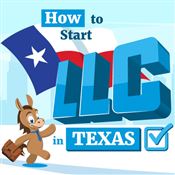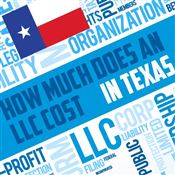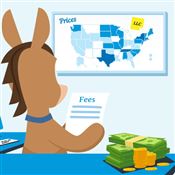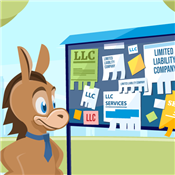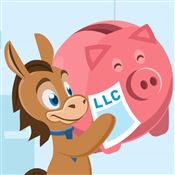How to Start an LLC in Texas for Free
Most LLCs in Texas must pay the $300 domestic filing fee. But is there a way to avoid this fee? Find out in this article.
 |
Starting an LLC in Texas without spending anything might be a stretch. But cutting down costs is achievable.
Form Your LLC - $0 + State Filing Fees
- 100% Accurate Filing Guarantee
- File your Articles of Organization
- Check your business name
- Digital welcome packet
- Initial phone consultations on business insurance and taxes
Start Your LLC for $0 - Just Pay State Fees
- Get step-by-step guidance to form your LLC
- Check business name availability
- LLC formation processing within 14 business days
- Business coaching program (tax, compliance, marketing)
- Invoicing and bookkeeping (30-day trial)
Start Your Business - $0 + State Filing Fees
- Covers all your required filings with the state, 100% accuracy guaranteed.
- 1 year of Worry-Free Compliance (renews at $199/year)
- Standard filing speed
- Other services are available with additional costs
That said, this guide will help you determine where and how you can save. You'll also find out the necessary expenses you'll have to budget for at the end of the article. Read on.
Why Should I Form an LLC in Texas?
Texas is often ranked as one of the best states to start a business, and it's easy to see why with the following benefits.
- No state income tax
The Lone Star State does not have an individual income tax or corporate income tax. For Texas LLCs, that means profits passed through to the owners aren't subject to state income tax, potentially saving you thousands compared to running a business in a high-tax state.It also makes tax filing simpler, since you're not juggling both federal and state income tax returns for your business income.
- Texas tax incentives
Texas entrepreneurs have access to a handful of state tax incentives. For example, the Enterprise Zone Program incentivizes job creation in economically distressed areas. Other programs offer tax refunds or exemptions for businesses involved in manufacturing, R&D, or renewable energy. - Strong asset protection
Texas is known for its strong asset protection laws. For example, the state's generous homestead exemption usually keeps your primary home safe from creditors, even if your business runs into trouble. - Strong economy
Texas has the second-largest economy in the U.S.[1], which means there's a huge market for many products and services. Forming an LLC here gives you a legal foundation to tap into that economic power, whether you're selling locally, expanding statewide, or even aiming for national reach. - Business-friendly state
Texas makes a lot of things convenient and affordable for entrepreneurs. You can file an LLC application online, by mail, or in person with multiple payment methods. Plus, many requirements are free, like the Texas sales tax permit for those who need to collect tax from customers.
More than anything, though, the best reason to form an LLC in Texas is because you want to turn your idea, side hustle, or freelance work into an official business that can earn money in the state. It gives you a legal structure to grow without putting your personal assets at risk.
Starting an LLC in Texas can be worth it if you can make much more money than you paid to form it. While the state has no income tax, there are still startup and ongoing costs—like the filing fee, registered agent services, and annual franchise tax.
If your business brings in steady revenue that outweighs these expenses, then forming an LLC can be a smart move financially. But if you're not turning a profit yet, those costs can start to feel like a burden rather than an investment.
Can I Form an LLC in Texas for Free?
You can start an LLC in Texas for free through waiver fees if you're a veteran. You can also save on others through free LLC formation packages or by filing all the paperwork yourself.
Here's how to do each of them.
Apply for a Veteran-Owned LLC Fee Waiver
In Texas, veterans who form an LLC can waive the $300 filing fee and gain a five-year exemption from the state's franchise tax.[2]
Your LLC only needs to meet the following qualifications (as stated in the Senate Bill 938):[2]
- Formed on or after Jan. 1, 2022 and before Jan. 1, 2026
- 100% owned by a veteran from the U.S. Armed Services
- The veteran has been honorably discharged
To create a veteran-owned business in Texas, you must first request a Veteran Verification Letter from the Texas Veterans Commission. Then, you must file the Certificate of New Veteran-Owned Business and Certificate of Formation to the Secretary of State. [2]
If you're not a veteran, however, a DIY can help you save on the cost of starting an LLC.
Try a Do-It-Yourself Approach
If you plan to form an LLC in Texas, you can perform the process yourself instead of opting for LLC formation services. These services can cost around $50 to $399.
That said, there are still LLC formation expenses you need to prepare for even if you perform a DIY:
| Texas LLC Fee | Cost |
|---|---|
| Texas LLC Formation Fee | $300 - $750[3] |
| Name Reservation Fee | $40[3] |
| Assumed Name Certificate Fee | $25[3] |
| Operating Agreement Fee | Up to $500+ |
| Registered Agent Services Fee | Up to $399+ |
The cheapest way to start an LLC in Texas is to do everything on your own. For example, you can file the Certificate of Formation, be the LLC's registered agent service, and create the Operating Agreement using a free template online.
Here's how you can get started:
- Name your LLC ($0 to $25)
There's no cost to naming your Texas LLC. It's included when you pay the LLC formation filing fee.That said, be sure to check if your desired business name is available. The Secretary of State has an online database that shows all the names already being used in Texas. There's a $1 fee for each name search.[4]
You can register a trade name for your Texas LLC.
For an additional $25, your Texas LLC can do business under a name different from its official registered name. Also called a DBA (Doing Business As), it's ideal if you want to operate under a business name that is more marketable or doesn't have an "LLC" at the end. - Create an operating agreement ($0 to $500+)
You're not required to have an operating agreement in Texas. But it's highly recommended because it outlines how the business will operate.It's a legally binding contract between the members and managers of the LLC. And it states important details such as the management structure, responsibilities, procedures, etc.
You can create an operating agreement for free with online templates. Alternatively, it could cost upward of $500 if you hire an attorney.
- Choose a registered agent ($0 to $399+)
All LLCs in Texas must have a registered agent.[5] They will be responsible for receiving business and legal documents on behalf of your LLC.You can do this for free if you appoint yourself as your LLC's registered agent. You only need to be at least 18 years old with a physical street address in Texas. Otherwise, registered agent services cost as low as $35 a year.
- File your Articles of Organization ($300 to $750)
Your LLC formation documents are commonly referred to as Articles of Organization. It contains important information about your LLC, like your LLC name, registered agent's name, management structure, etc.Texas' filing fee costs $300 for domestic[3] and $750 for foreign LLCs.[3] Unfortunately, there's no way around these fees unless you're a veteran.
Foreign LLC Registration in Texas
In Texas, the filing fee for foreign LLC registrations costs $750. Instead of the Articles of Organization, you need to register an Application for Registration of a Foreign Limited Liability Company in Texas. This is an entirely different process from a domestic LLC application and involves other steps. - Get an EIN ($0)
An Employer Identification Number (EIN) is a unique nine-digit number assigned by the Internal Revenue Service (IRS). It's used to identify a business entity for tax-related purposes.Applying online is the fastest and easiest way for most applicants. If you register online, you can get an EIN in 15 minutes at no cost.
Do these steps seem too complicated? Some business formation services below can help you do this for free.
Select a Free LLC Formation Package
LLC Formation services can answer your questions and ensure you're following the correct procedures when forming your LLC. They also remove the hassle of doing the paperwork yourself.
These services often offer:
- Business name availability search
- Preparation and filing of your LLC paperwork
- Registered agent services
- EIN services
Some companies offer to file your LLC formation documents for free while providing freebies like registered agent services for 1 year. But you may still have to pay for other services, like creating an operating agreement.
Fortunately, you don't always have to pay for Texas LLC formation services. Check out the companies below.
Best Free LLC Formation Packages
The best free packages offer additional services like registered agent services or free bank accounts. Read on.
ZenBusiness: Starter Package
ZenBusiness has a Starter package for new entrepreneurs. It includes an LLC formation service and a 100% accuracy guarantee. This means your formation documents will be refiled for free if there is any mistake due to their error.
It even offers a Worry-Free Compliance service to ensure you don't miss deadlines for your annual report. However, ZenBusiness' registered agent services aren't free. It costs $199/year.[6]
Start Your Business - $0 + State Filing Fees
- Covers all your required filings with the state, 100% accuracy guaranteed.
- 1 year of Worry-Free Compliance (renews at $199/year)
- Standard filing speed
- Other services are available with additional costs
Tailor Brands: Basic LLC Formation
Tailor Brands doesn't charge a fee for LLC formation services. Plus, it can get you a free business bank account through Mercury.
Mercury accounts have no monthly maintenance fees and don't require a minimum balance.[7]
In addition, Tailor Brands can help with business branding and marketing. It offers affordable services like social media marketing, logo creation, and website design.
Start Your LLC for $0 - Just Pay State Fees
- Get step-by-step guidance to form your LLC
- Check business name availability
- LLC formation processing within 14 business days
- Business coaching program (tax, compliance, marketing)
- Invoicing and bookkeeping (30-day trial)
Inc Authority: Free LLC Package
Inc Authority helps you form an LLC online for free. But like all free LLC formation packages, you still need to pay the $300 Texas domestic LLC filing fee.
You won't pay for Inc Authority's registered agent services during your first year.
You may even benefit from its live customer support by phone or email. This makes it easy to ask questions about your business formation.
Having said all this, it's not possible to start an LLC in Texas completely for $0. Below are annual expenses you can't avoid.
LLC Annual Expenses You Can't Avoid
LLCs generally consider 2 types of expenses—the annual report fees and business taxes. Read on to see if Texas charges these and for how much.
Texas Annual Report
Unlike most states, Texas doesn't require LLCs to file annual reports with the Secretary of State. Texas doesn't charge annual report fees either.
But you must still submit the Public Information Report to the Comptroller's Office by May 15 each year.[8] LLC services offer to file this for you for a fee, but you can do this online at no cost.
The minimum cost of maintaining an LLC in Texas equals your annual franchise tax. You may have to pay between 0.331% and 0.75% of the LLC's taxable income if your annualized total revenue exceeds the "no tax due" threshold.[9]
Texas Business Taxes
LLC members are considered self-employed and must pay self-employment taxes on their share of the profits. But there's also a federal income tax to take note of.
| Tax | Rates |
|---|---|
| Self-employment Tax | 15.3% (combined); 12.4% goes to Social Security and 2.9% to Medicare[10] |
| Federal Income Tax | 10% to 37% of your taxable income[11] |
In addition, as of 2024, LLCs that earn more than the annual tax threshold must file a franchise tax report each year. The no tax due threshold as of 2024 is $2.47 million.[12]
You may be subject to more tax depending on the nature and purpose of your business.
A franchise tax, also called a privilege tax, is a fee that businesses pay to the state for the privilege of doing business in Texas. The franchise tax report is submitted to the Comptroller's Office for free. The only payment due is any franchise tax that your Texas LLC owes for that filing year.[13]
Other Potential Costs for LLCs
Some of these costs aren't mandatory. But since they can be essential in starting an LLC, it's always better to prepare for them.
Business Permits and Licenses
Texas doesn't have a general state license. However, you need a Texas sales and use tax permit if your LLC sells tangible personal property. Or if you offer taxable LLC services.
You can get this online for free. Just allow 2 to 3 weeks to receive your permit.[14]
Aside from the sales and use tax permit, the Lone Star state prefers leaving business licensing requirements to local jurisdictions and specific industries.
The number of permits and licenses your LLC needs depends on its business purpose. Some businesses may be regulated simultaneously by various governmental offices, racking up total costs of over $1,000.
There isn't a single, comprehensive website or resource that lists all available permits and licenses for businesses in Texas.[15] Reach out to the Texas Business Permit Office or ask a business lawyer to ensure you comply with all necessary licensing requirements.
Business Bank Account
An LLC provides limited liability. This means personal assets (like your home and car) are protected from business debts and liabilities.
That said, LLCs are required to have a separate business bank account to maintain a clear separation of personal and business finances.
While opening a business bank account is frequently accompanied by charges, check out banks for LLCs that have low fees and valuable perks to help your business grow.
Often required by banks, a Certificate of Account Status is a document that proves that your LLC can do business in Texas. It means you've paid your LLC's fees and taxes. You can get a Certificate of Status from the Texas Comptroller.[16]
Business Insurance
Unlike other states, Texas doesn't require most private employers to have workers' compensation insurance.[17] However, it's still recommended to have business insurance to help protect your LLC.
When shopping around for one, consider the specific risks your LLC faces. Prioritize getting the right coverage for your specific needs and get quotes from multiple providers.
Let's say you don't have employees. Your LLC may still benefit from business insurance that covers expenses from unexpected events and damaged property.
Investing in the right insurance can help protect your business from financial losses. For example, business property insurance covers your LLC's furniture and equipment against damage or loss.
Business Website
A website and social media presence are dedicated online spaces for your business. They're essential for marketing, customer engagement, and brand visibility in today's digital world.
Hire a professional web developer if you want a highly customized and unique website. Or do it yourself using a website template through popular content management systems like WordPress and Wix (around $15 to $20/mo).
Even if you're not planning to build a business website now, it's a good idea to at least buy the domain name. This prevents others from using your LLC's name as a web address.
Domain squatters often monitor newly registered LLC names. They purchase corresponding website domains and then resell them at significantly higher prices.
Types of LLC in Texas
There are several types of LLC structures in Texas:
- Single-member LLC
An LLC with only one owner, common for freelancers and solopreneurs. It still gets full liability protection and can be taxed as a sole proprietorship or S corp. - Multi-member LLC
An LLC with two or more owners. It can be member-managed, meaning all the members are involved in the day-to-day operations of the business. Or, it can be manager-managed, so only one person is in charge of running the LLC. - Series LLC
A Series LLC allows you to create individual "series" or units under a single LLC, each with its own assets, liabilities, members, and business purpose. It's commonly used for businesses managing multiple product lines. Each series can have liability protection separate from the others. - Aged shelf LLC
A pre-formed, inactive company that's been registered with the state and left "on the shelf" for months or years without doing any business. Because they have already been formed, you could purchase a Texas shelf LLC, apply for an EIN, and open a business bank account all on the same day. - Professional LLC
This one's for licensed professionals like doctors, lawyers, architects, accountants, or veterinarians who want to form an LLC. All members must be licensed in the same profession. - Foreign LLC
An LLC formed in another state that wants to do business in Texas. You must register your out-of-state LLC as a foreign entity with the Texas Secretary of State to operate legally. - Nonprofit LLC
Texas technically allows an LLC to operate as a nonprofit only if it's structured properly under federal IRS rules and meets specific legal requirements. This is rare because most nonprofits in Texas are formed as nonprofit corporations instead.
Of course, one type of LLC can also be another. For example, a single-member LLC could also be a foreign LLC. You can mix and match the different types of Texas LLC structures based on your needs.
To dissolve a Texas LLC, you'll need to wind up any remaining business affairs first. Then, submit two signed copies of the certificate of termination
Alternative Business Structures in Texas
Aside from a limited liability company, Texas also allows the following business structures:
- Sole proprietorship
The most common and simplest business structure. You don't have to file any legal documents and can manage the business on your own.An LLC can be owned by just one person, too. But the difference is a sole proprietorship doesn't protect your personal assets from business liabilities like an LLC does.
- General partnership
Created when two or more people agree to do business together. Like an LLC, a general partnership can file a DBA to sell products or services under a unique business name. - Limited partnership
An ideal structure if at least one of you is a general partner and at least one is a limited partner. A general partner manages the day-to-day operations and is personally liable for the debts and obligations of the business.Meanwhile, a limited partner invests money into the business but doesn't manage it. Their liability is limited to the amount they invested.
A limited partnership is not the same as a limited liability company. All members of an LLC typically have limited liability, meaning their personal assets are protected regardless of their level of involvement in the business.
- Corporation
Like an LLC, a corporation is a separate legal entity created by filing the necessary documents with the Texas Secretary of State.But while an LLC is owned by members, a corporation has a more complex structure. It is owned by shareholders, managed by a board of directors, and run by officers (like a CEO or CFO).
Several factors can help you decide what kind of business structure you need. For example, you can think about your vision for the size and nature of your company; whether you plan to keep it small and manageable or grow it into something much larger.
Also, think about the level of structure and formality you're prepared to maintain. Corporations require more rigid systems like boards and annual meetings. Meanwhile, LLCs are easier to manage but still protect you from lawsuits and other liabilities.
Bottom Line
You can start an LLC in Texas for free if you qualify for fee waivers. These fee waivers are available for veteran-owned LLCs. And they waive the mandatory fees for filing your paperwork.
Unfortunately, if you're not qualified, there's no avoiding the filing fees. There are also other fees that you'll have to budget for that come with starting an LLC.
LLC formation services that offer free packages can make the work easier without adding to the cost. You can also do the paperwork yourself so you can avoid extra fees altogether.
Start Your Business - $0 + State Filing Fees
- Covers all your required filings with the state, 100% accuracy guaranteed.
- 1 year of Worry-Free Compliance (renews at $199/year)
- Standard filing speed
- Other services are available with additional costs
References
- ^ Texas Economic Development and Tourism Office. Texas Economic Snapshot, Retrieved 8/1/2025
- ^ Texas Secretary of State. Business Information for Veterans, Retrieved 8/12/2025
- ^ Texas Secretary of State. Business Filings & Trademarks Fee Schedule, Retrieved 8/12/2025
- ^ Texas Secretary of State. Filing Your Business, Retrieved 8/12/2025
- ^ Texas Secretary of State. Acceptance of Appointment and Consent to Serve as Registered Agent, Retrieved 8/12/2025
- ^ ZenBusiness. Products & Pricing, Retrieved 8/12/2025
- ^ Mercury. Frequently Asked Questions, Retrieved 8/12/2025
- ^ Comptroller.Texas.gov. Filing Requirements, Retrieved 8/12/2025
- ^ Texas Comptroller of Public Accounts. Franchise Tax, Retrieved 8/12/2025
- ^ IRS. Self-Employment Tax (Social Security and Medicare Taxes), Retrieved 8/12/2025
- ^ IRS. Federal income tax rates and brackets, Retrieved 8/12/2025
- ^ Comptroller.Texas.Gov. Texas Comptroller of Public Accounts, Retrieved 8/12/2025
- ^ Comptroller.Texas.gov. Changes to No tax Due Reporting for 2024 Reports, Retrieved 8/12/2025
- ^ Comptroller.Texas.Gov. Texas Online Tax Registration Application, Retrieved 8/12/2025
- ^ The State of Texas. Business Permit Office, Retrieved 8/12/2025
- ^ Texas Comptroller. Franchise Tax Account Status, Retrieved 8/12/2025
- ^ Texas Department of Insurance. Workers' compensation insurance guide, Retrieved 8/12/2025
- ^ Texas Secretary of State. Terminations and Reinstatements FAQs, Retrieved 8/1/2025
Write to Nicole King at feedback@creditdonkey.com. Follow us on Twitter and Facebook for our latest posts.
Note: This website is made possible through financial relationships with some of the products and services mentioned on this site. We may receive compensation if you shop through links in our content. You do not have to use our links, but you help support CreditDonkey if you do.
|
|
| ||||||
|
|
|



